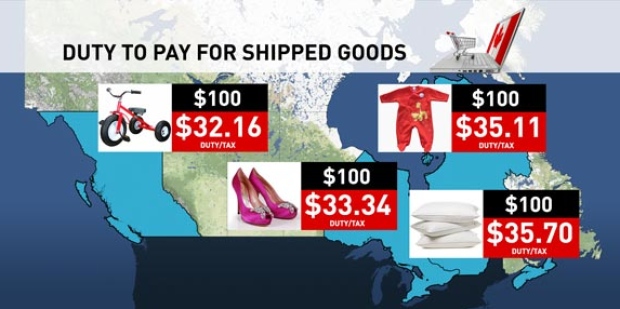As anyone who has ever ordered anything online from an American retailer knows, there are some risks when engaging in this adventure : extra duties! Canadian customs officers have the right to intercept and delay your shipment if it’s over a $20 value and add on to it provincial and federal taxes and of course, extra duty charges. By the time you’ve received your order, it could double in price, making you ponder why you even bothered ordering online to start off with.
Often perceived as hidden protectionist taxes, Canada’s outdated de minimis threshold – the value at which international shipments are exempt from taxes, hasn’t been updated since 1985, an era when online retail still seemed like science fiction.
In late June, three economists in Washington released a study demonstrating that by keeping a low threshold, Canadian tax payers are actually footing a hefty bill of approximately $166 million to essentially collect $39 million in additional taxes and duties on imported goods.
The economists’ study which was commissioned by eBay Canada and peer-reviewed by the C.D. How Institute, recommends bringing up the de minimis threshold to $80 to give Canadian consumers a small break and of course stimulate cross-border commerce. In comparison, U.S. customs agents don’t even both with any inbound shipments that aren’t worth more than $800, a threshold that was increased earlier in February 2016 from $200 previously. That step forward has allowed American importers to see a reduction in customs procedures and taxes that would normally be collected, therefore accelerating the delivery of merchandise and stimulating trade.
Ebay Canada had previously tried back in 2014 to lobby the then Conservative government, without success, to raise the threshold to $200 similarly to the U.S. at that time. In a 2014 interview with the CBC, now Treasury Board president, Liberal Scott Brison, had stated that the de minimis level seemed “completely out-of-wack with other countries”, pledging at the time of the interview that a Liberal government would examine the possibility of reviewing the limit.
Domestic Businesses in Danger?
What would happen if the government was to go ahead with an augmented threshold? It would put domestic businesses at a certain disadvantage as online shoppers wouldn’t pay the same provincial and federal taxes as customers of stores actually located in Canada.
The Retail Council of Canada believes that the threshold should remain as is, ideally forever. In fact, they believe that should the de minimis be raised, it would create a 12.3% tax disadvantage for Canadian retailers and open the flood doors for American sellers to offer free shipping to Canada and thus resulting in an exponential growth of cross-border online shopping. The inevitable result would revenue losses for the retailers themselves but also for government coffers and laid off employees.
SMEs Pushing for Modernization

Small and medium-sized businesses (SMEs) are constantly on the look for opportunities to grow which often translates to looking at doing business beyond Canadian borders. A low de minimis as is the case right now, is much more expensive for Canadian SMEs as they end up paying more for their inputs compared to their global peers, making much harder for them to be competitive on the international stage.
Just recently, a group of Canadian SMEs that use eBay as their platform, sent a letter to Prime Minister Trudeau thanking him for his commitments towards small business but also encouraging him to move forward with the modernization of trade policies to allow them to take full advantage of the international market.
In the Liberal government’s first budget there was no mention of modifying the de minimis threshold, lobbyists for Yes and No camps continue to pressure officials and elected representatives to help them understand the arguments for and against modernizing the amount. As of yet, no clear indication has come from the government on its plans.

 Payment
Payment  My Account
My Account